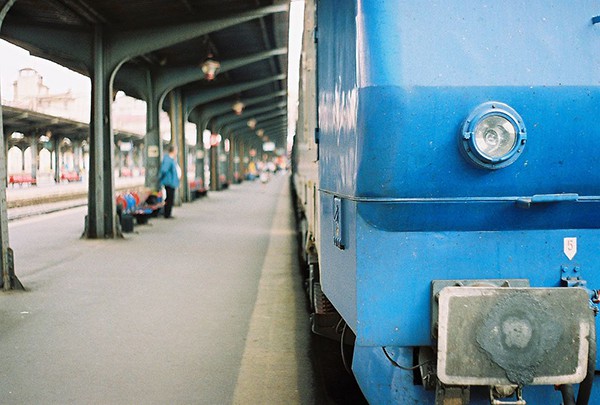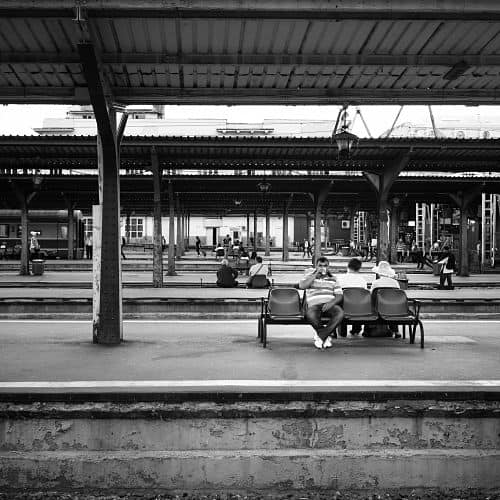Most of our devoted Allies will remember that we started this year with a bang, aka by launching the SAPIENS-Allegra writing competition to discover new public anthropologists. For those for whom this is fresh news, do look into the competition guidelines – and show us what you’ve got by the deadline of June 1!
During this spring we will be showcasing just what kind of things we have in mind as we share some of our favourite posts – or what we also like to refer to as ‘Jewels from Allie’s Archives’! We kick things off with this post by one of our (many) favourite authors, namely Bruce O’Neill.
Bruce participated in the wacky Allegra Panel at the EASA 2014 titled ‘Boredom, Intimacy and Governance in ‘Normalized’ Times of Crisis’, an experimental event in many respect that culminated in the shared art-experience directed by Amanullah Mojadidi. We loved Bruce’s paper already at our panel, and were very pleased to share this post soon thereafter.
Boredom and the “Life Unlived”
“What boredom. And everyday is like this,” Mircea explained in the spring of 2011. His friend, Nicu, nodded in agreement as he gave a large exhale of his freshly lit cigarette. “There’s no work. There’s no money. There’s nothing to do but sit here.” We sat atop a shallow flight of stairs overlooking the parking lot of the Gara de Nord railway station in Bucharest, Romania. In their mid-twenties, Mircea, Nicu, and his partner Ioana, squatted in an abandoned building not too far from the station. Mircea and Nicu spent their mornings looking for day labor off the books.
In the aftermath of the 2008 global financial crisis, however, there was little demand for unskilled workers. On the majority of days when they could not land a gig on a construction site in the city, or clearing a field just outside of it, they headed to the Gara de Nord. Since their early teens, Mircea, Nicu, and Ioana hustled pocket change at the station by directing traffic in the parking lot.
Considered a nuisance by ticketed passengers, the city police criminalized the crew’s efforts at entrepreneurism as “begging.” “There’s nothing left for us to do in this country,” Mircea sighed.
Two decades after the fall of Communism and a profound boredom drifts back and forth across Bucharest, Romania. Neoliberal reforms intended to integrate this once isolated Communist country into the pleasures and possibilities of global consumerism resulted in a chronically unstable economy. While an elite class of professionals experienced a rising standard of living, a growing pool of low-skilled laborers found themselves chronically unemployed and living on the streets, something unheard of under Communism. The effects of the 2008 global financial crisis only rendered economic hardship more pronounced.
Without a stable salary, homeless people like Mircea, Nicu, and Ioana are unable to participate in an urban life increasingly organized around consumer practices.
 Later that day, when the coming and going of cars slowed to a trickle, Nicu and I sat in the parking lot and opened cans of beer. After a few sips, Nicu reflected upon his efforts to stimulate senses dulled to their core:
Later that day, when the coming and going of cars slowed to a trickle, Nicu and I sat in the parking lot and opened cans of beer. After a few sips, Nicu reflected upon his efforts to stimulate senses dulled to their core:
“Every night, we take whatever we’ve earned and we drink a beer, a soda, whatever we can afford, because we have to live,” he explained. “After spending a day working the lot, are we not allowed to live – to have a beer with friends?”
With this crisis, though, we can’t live much of a life at all… It’s incredibly boring.
“The world of commodities,” Henri Lefebvre noted, “tends to absorb use value into exchange and exchange value” (Lefebvre 1996: 170), so that consumption becomes a predominate social value. It is an observation with traction in Bucharest, where, as Nicu insists, the thrill of exchange—of consumer stimulation—rests at the very heart of what it means to live a life. By the same token, the predominance of exchange value also shapes, in a historically specific way, how individuals understand and manage the erosion of normative expectations for living.
As labor pools contract and government services scale back in Romania, but also across Europe and North America, those ejected from work and home experience the precarious unraveling of the present at the level of consumption. Life stops as unstable markets render everyday routines and long-held aspirations unaffordable; and a diminished capacity to consume leaves the economically vulnerable bored day in and day out.
In an effort to manage boredom, as much as their growing sense of social exclusion, Nicu and his crew hustle in order to buy whatever they can afford. It is a consumer-based response to deepening poverty in a moment of growing inequality that seeks to buy back into the promise of exchange. While more consumption promises temporary relief, the collective cultivation of a more robust sense of value seems in order.
References:
O’Neill, B. (2014). Cast Aside : Boredom, Downward Mobility, and Homelessness in Post-Communist Bucharest. Cultural Anthropology 29(1), 8–31.
O’Neill, B. (2015). Bored Stiff: Sex and Superfluity in a Time of Crisis. Public Culture.forthcoming.
*****************
Featured image (cropped) by gato-gato-gato (flickr, CC BY-NC-ND 2.0)
This post was first published on 23 September 2014.





